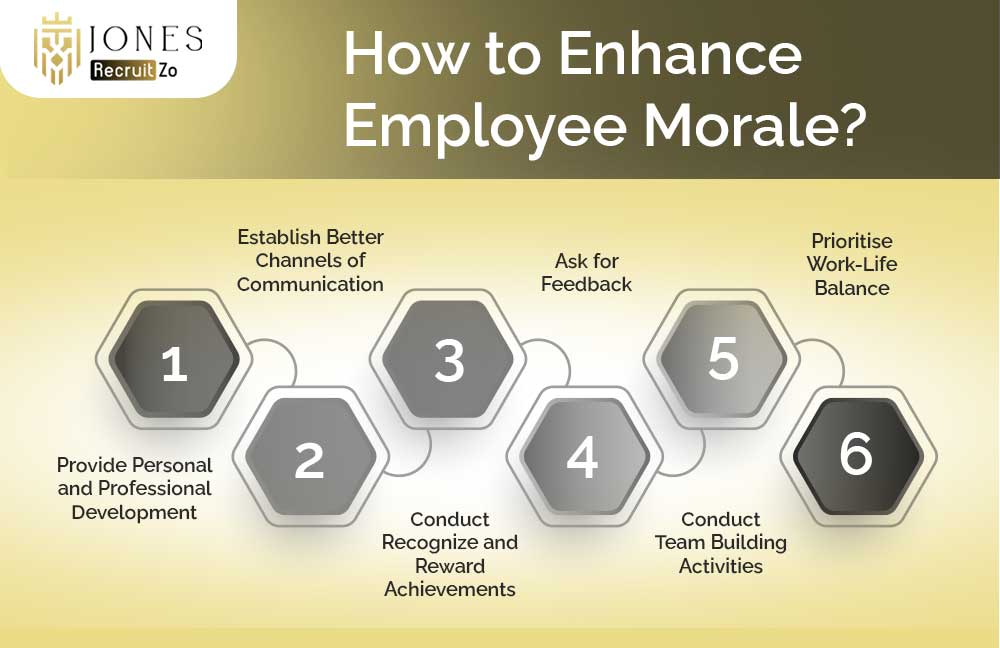What is Employee Morale?
Employee morale is defined as the collective attitude, satisfaction, and outlook that employees have toward their work and workplace. This means the extent to which motivated and engaged employees are willing and able to assume their roles within the workplace. High employee morale creates a positive, productive work environment; low employee morale results in dissatisfied, disengaged, less effective employees. Understanding the meaning of employee morale is crucial for fostering a supportive workplace that aligns with organisational goals.
Why is Employee Morale Important?
Employee morale is a vital element in the success of any organisation. It influences retention, productivity, workplace culture, and overall employee satisfaction.
-
Improved Retention
High morale serves to lower employee turnover and, at the same time, retain great talents. Employees who enjoy being valued and supported tend to turn their interest outward. And it should not be forgotten that retention benefits the organisation in terms of experienced and skilled employees by reducing recruitment and training costs.
-
Increased Productivity
An employee with good morale is more likely to go above and beyond what is required to meet organisational goals. This is better productivity for the organisation as it motivates employees to be proactive and engaged in achieving targets and to do whatever it takes to meet them.
-
Positive Work Culture
Employee morale is important because it shapes the culture of the workplace. Positive morale will foster teamwork, collaboration, and respect among employees with the resultant harmonious and inclusive environment. The work culture directly affects the organisation as a whole in terms of success level.
-
Enhanced Employee Satisfaction
Employees satisfied will show higher morale, which translates into increased commitment towards the organisation and improvement in probable cases of satisfaction of employees at work. Employee satisfaction enhances loyalty to work and even improves performance while decreasing absenteeism.
How to Measure Employee Morale?
Measuring employee morale provides insights into how employees feel about their workplace, enabling organisations to take corrective actions if needed.
-
Employee Surveys
Employee surveys are perhaps the best way to get accurate employee morale measurement. Employees can give their true opinions on the workplace, leadership, and job satisfaction without fear of changes to these.
-
One-on-One Meetings
One-on-one meetings between the employee and manager help the managers know the various aspects of the employee as a person. This encourages having frequent one-on-one forums between managers and employees to allow them to build trust and the opportunity to discuss morale-related issues.
-
Turnover and Retention Rates
By studying turnover and retention rates, one analyses indicators pertinent to employees’ morale. High turnover accounts reveal a situation of low morale among employees, while very high retention accounts show that employees are in a satisfied and engaged state.
Factors That Influence Employee Morale

Employee morale is shaped by several factors that affect how employees perceive their work environment and leadership.
-
Leadership
Great leaders give motivation to their employees. They lead by example, by communicating well and being helpful, to raise the morale of the whole team. Bad leadership has the potential to lower morale by a mile.
-
Communication
Open and frank communication has made employees feel well-informed and valued. Prepare real-time updates and clear directions, and improve the accessibility of management to produce good employee morale and avoid miscommunication.
-
Reward & Recognition
Appreciation and recognition of employees’ efforts can produce a great elevator to morale because employees begin to feel acknowledged. Something simple, like public collections of achievements or permitted awards, could work wonders.
-
Work-Life Balance
A good work-life balance is always important for employee morale. Employees working too hard reach burnout at some point, and this leaves their morale in a downturn; however, flexible schedules and adequate time off tend to increase satisfaction.
How to Enhance Employee Morale?

Improving employee morale requires strategic efforts that address both personal and professional needs.
-
Provide Personal and Professional Development
Creating growth opportunities fosters the morale of employees in that it becomes a demonstration that the organisation values their development. Training programs, workshops, and career advancement options give employees an extra boost in attaining their goals.
-
Establish Better Channels of Communication
Encouraging people to communicate openly creates faith and interest. The employees also feel that they are connected with the company. Setting a clear channel with such recognition leads to effective churches where employees can comfortably lay concerns and give feedback.
-
Conduct Recognise and Reward Achievements
Rewarding work, big and small, builds employee morale and energises them—they can be motivated through various forms of recognition among them, such as awards, bonuses, and verbal appreciation in team meetings.
-
Ask for Feedback
Encouraging regular feedback from employees shows them that their opinions are valued. Having their suggestions implemented even improves a company’s morale because it shows the organisation is interested in improving the workplace experience.
-
Conduct Team Building Activities
Team-building activities improve relations among employees and encourage teamwork and a sense of belonging. These activities enhance employee morale as they create a sense of belonging and strengthen team spirit.
-
Prioritise Work-Life Balance
It greatly cheers up employees when management encourages them to maintain a balance between work and home life. A flexible work schedule, plus an adequate leave policy, plus mental health support- all will motivate employees to engage more and stay productive.
Employee morale is a critical factor that determines the success and sustainability of an organisation. By understanding its meaning, measuring it effectively, and addressing the factors that influence it, organisations can foster a supportive and productive workplace. Enhancing employee morale not only benefits employees but also drives organisational growth and success.
FAQs
1) What is Employee Morale?
Employee morale refers to the overall attitude, satisfaction, and motivation employees have towards their work and workplace. It reflects how engaged and positive employees feel in their roles, which directly impacts productivity and workplace harmony.
2) Why is employee morale important?
Employee morale is essential for retention, productivity, and creating a positive work culture. High morale enhances employee satisfaction, reduces turnover, and improves collaboration, all of which contribute to organisational success.
3) What are the factors influencing employee morale?
Factors that influence employee morale include leadership, communication, reward and recognition, and work-life balance. These elements shape how employees perceive their workplace and affect their overall satisfaction and motivation.
4) What are some strategies to improve employee morale?
To improve employee morale, organisations can offer professional development opportunities, establish better communication channels, recognise and reward achievements, gather employee feedback, conduct team-building activities, and prioritise work-life balance. These efforts create a supportive and engaging work environment.







